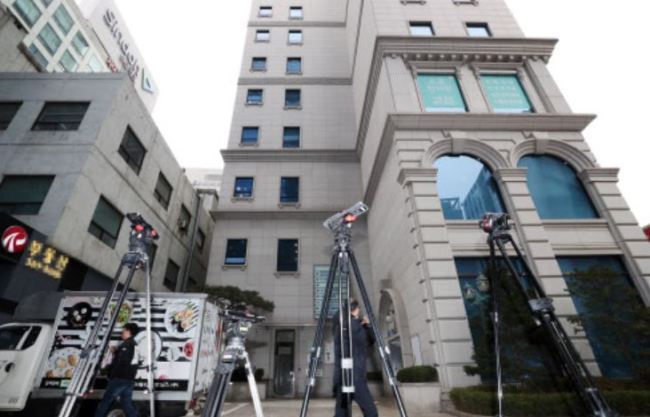Prosecutors are questioning people close to former President Lee Myung-bak as they prepare for his interrogation Wednesday over a string of corruption allegations that include bribery, abuse of authority, embezzlement and dereliction of duty.
The prosecution on Sunday questioned Lee’s son-in-law Lee Sang-joo, former Vice Minister of Knowledge Economy Park Young-joon and the chief of Lee’s Cheonggye Foundation Song Jung-ho as suspects over their alleged involvement in receiving illicit funds on behalf of the former president mostly during his 2008-2013 term.
Following five months of investigation, the Seoul Central District Prosecutors’ Office subpoenaed the ex-president to appear at the office Wednesday for interrogation as a suspect.
 |
| Tripods are placed in front of former President Lee Myung-bak’s office in Daechi-dong, southern Seoul, as reporters await his arrival Monday morning. (Yonhap) |
Lee faces nearly 20 charges, including violation of the election law and the law on management of presidential records.
Lee is suspected of having received some 11 billion won ($10.3 million) in illegal funds from the state spy agency, individuals and businesses, including Samsung.
The prosecution believes the National Intelligence Service paid some 1.75 billion won from its audit-free “special activities” account to former Cheong Wa Dae officials during the Lee administration.
Having identified Lee as the “main culprit” of bribery when it indicted one of his key aides Kim Paik-joon last month for receiving illicit funds from the NIS, the prosecution is likely to hold Lee accountable for most of the NIS funds that were channeled to his presidential office.
Prosecutors also see the $5 million in litigation fees that Samsung Electronics allegedly paid between 2007 and 2009 on behalf of DAS, an auto parts manufacturer controlled by Lee’s brother, as a kickback to the former president. The prosecution said it had found evidence that Samsung paid the fees DAS owed to law firm Akin Gump for handling its lawsuit aimed at recouping investment from a US-based investment advisory firm BBK.
Lee is also suspected of receiving, through his brother Lee Sang-deuk and his son-in-law, some 2.25 billion won from Lee Pal-sung between 2007 and 2011 in return for getting him appointed as chairman of Woori Finance Holdings.
The former president also allegedly accepted 500 million won from Daebo Group, which runs rest areas on expressways, in exchange for business favors, and 400 million won from former lawmaker Kim So-nam for the ruling party’s nomination in the 2008 parliamentary election.
Under the Act on Aggravated Punishment of Specific Crimes, receiving bribes of 100 million won or more is subject to at least 10 years in jail. The maximum penalty is life imprisonment.
Regarding the bribery charges, Lee said that he was not aware of any money transfers to him or his associates. He called the prosecution’s investigation “political revenge” by the Moon Jae-in administration.
Lee is also accused of abusing his power to get the presidential office and the Foreign Ministry to help DAS recover its 14 billion won investment in BBK, which was run by his former business partner Kim Kyung-joon.
Having concluded that the former president is the real owner of DAS, the prosecution is expected to ask him to explain the irregularities at DAS, including the amassing of slush funds totaling some 30 billion won. Prosecutors have found that billions of won from the secret funds were used as Lee’s campaign money during the 2007 presidential election.
Prosecutors are also likely to question Lee over why presidential records, which should have been placed at the National Archives as required by the law, were found in the storage of DAS, and allegations that he evaded tax by holding property and savings under borrowed names.
By Kim So-hyun (sophie@heraldcorp.com)

